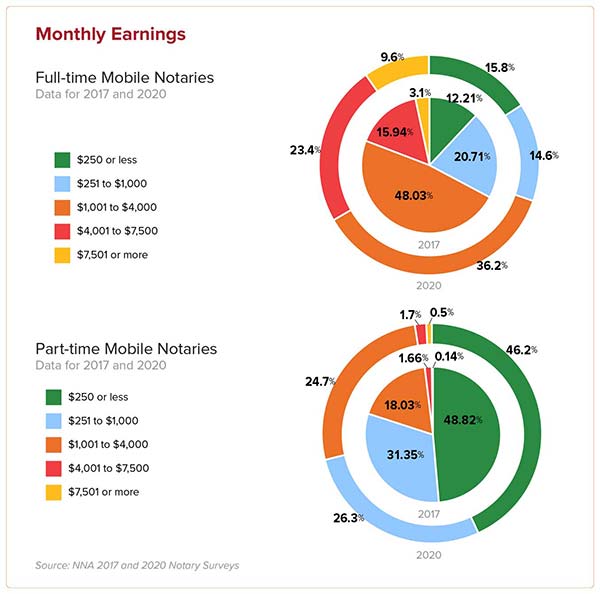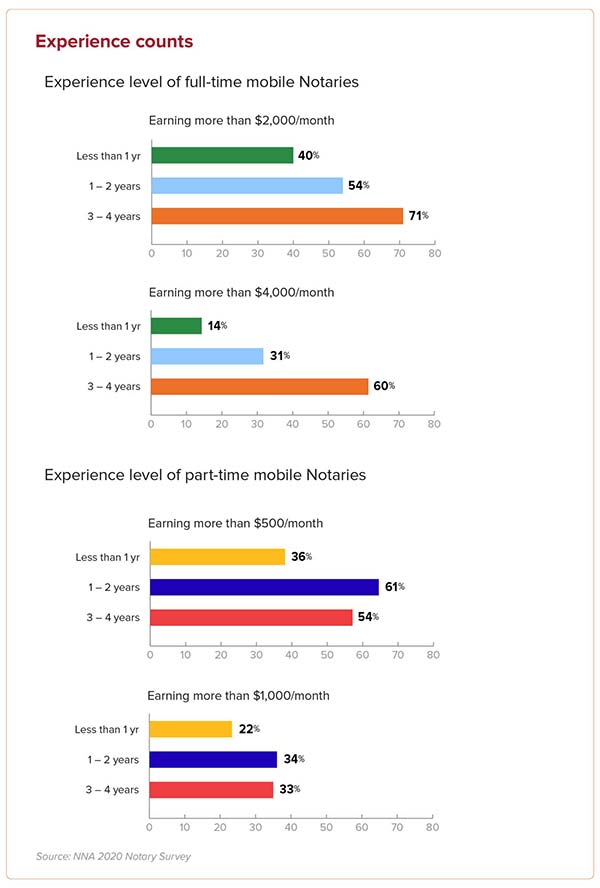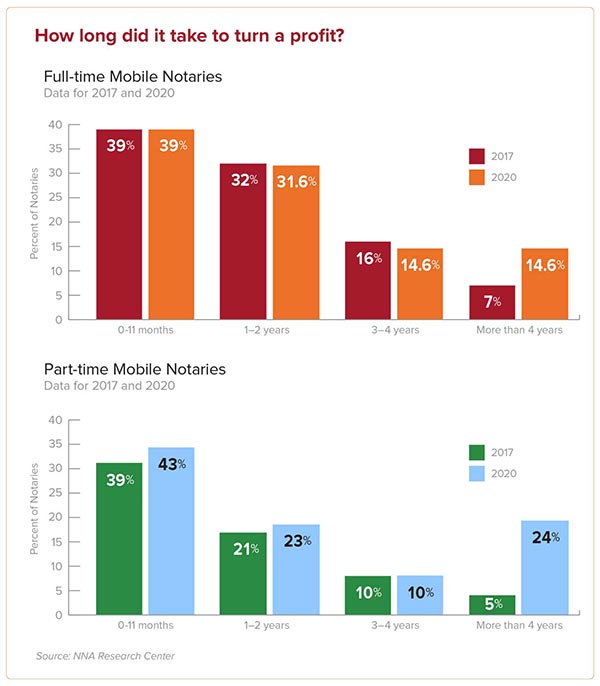Amid the mobile Notary boom and increased public demand for mobile services, new Notaries are asking the enduring question: How much can I make? And while the answer can vary dramatically, consider these insightful responses from the NNA’s 2020 Notary Survey:
- More than half of all full-time mobile Notaries earn $2,000 or more a month.
- Nearly two-thirds of full-timers who have been in business for at least 3 years earn $4,000 or more a month, and 16 percent earn more than $7,500 a month.
- 43 percent of all part-time, self-employed Notaries earn more than $500 a month; nearly 30 percent earn more than $1,000 a month.
- 88 percent of full-timers and 80 percent of part-timers considered their businesses profitable enough to continue working as mobile Notaries.

NNA surveys in 2017 and 2020 of more than 3,000 mobile Notaries as well as feedback from the Notary community paints a clear picture: If you put in the time and effort, working as a mobile Notary or NSA can provide you with good income and the chance to be your own boss.
To help you get started, we asked successful NSAs and mobile Notaries how they make a profit in today’s market. And while everyone’s story is different, their success had 3 important factors in common: Gaining experience, dedication, and planning.
Experience Counts
Your earning potential depends on many factors, but one of the most important is dedicating yourself to earning experience. New Notaries usually don’t start out the gate earning large fees, so you must be patient, especially during the first year or two.
“It’s not a get-rich-quick business,” notes David McCallister, who operates A Notary Group in the Boise, Idaho suburbs. But once you get 12-24 months of experience, you can bring in higher fees. We asked Notaries who have been in business 1-2 years how much they earned. More than 60 percent reported $1,000 per month working part-time, and that figure jumped to $2,000 for more than half of the full-timers surveyed.

One reason to start a Notary business is demand for Notaries is consistent in many different types of transactions. Loan documents aren’t the only thing customers need notarized. Many people stuck at home decided to update their medical and legal documents during the pandemic. 2020 saw an unprecedented flood of requests to notarize wills, powers of attorney, pension forms, healthcare directives and more.
So, if you want to start a Notary business, how do you sustain it? The answer is planning ahead.
Starting a full-time Notary business requires dedication — and a plan
Taking the leap to start your own business is exciting, but also daunting. The cost of starting a Notary business is low compared to other careers, but, success still depends the effort you’re able to put into it. You need to plan your budget, marketing and work schedule.
Before becoming a part-time NSA, Heather Wilson of Heather the Notary in San Francisco, California, planned to start her own laundromat. While the laundromat didn’t work out, the business plan she developed gave her the basic knowledge she needed to launch a business, and that’s when serendipity stepped in.
“One of my [banking] clients had done a refi and got to talking to the NSA at the signing and found out she was making $50,000 to $60,000 per year working part time,” she says.
From there, Wilson took several training courses and began working part-time as a Signing Agent while keeping her banking job. She made a remarkable amount as a part-time Signing Agent — earning more than $20,000 per month. By September, she was essentially working two full-time jobs. She had to make a choice, and she chose to be a full-time NSA.
Wilson says it’s far more important to provide quality Notary services and maintaining a successful business than trying to get rich quick.
“I’m not in it for the money,” she says. “I’m in it for the long game. I treat it like a real job, a career.”
Priscilla Watson of Notary by P. Watson in Tampa, Florida, is also starting her own full-time Notary business. A medical industry professional, she sees being a NSA and mobile Notary as more stable than her current job.
Watson’s sister, who has been a Notary for several years, encouraged her to get her commission. But it wasn’t until the onset of COVID-19 that Watson took her sister’s advice.
“Jobs were becoming scarce, and I wanted a backup,” says Watson, who became a Notary in August 2020. Like Wilson, she quickly found she had to make a choice between working two jobs — and turning down an increasing number of signings — or choosing one over the other.
Watson is planning to go full-time as an NSA. She’s preparing to form a signing company with her sister, who also is a certified NSA. In addition, Watson has been certified as a fingerprint provider, taken apostille training and has gotten certified to perform remote online notarizations.
As Watson’s experience illustrates, providing a range of non-Notary services, such as fingerprinting, apostille services, field inspections, courier services or I-9 services can earn you extra income when you aren’t doing general Notary work or loan signings.
Working as a part-time Mobile Notary or Signing Agent
Not every NSA or mobile Notary wants to make it a full-time career. In fact, more than 61 percent notarize as a part-time gig. But even part-timers report they are doing well, reporting earnings ranging from anywhere as low as a few hundred dollars to $20,000 a month from notarizations.
While five-figure numbers are very rare, part-time work can still be profitable. For example, Patty Jansen of P.J.’s Mobile Notary in Silverton, Oregon, was looking for a way to stay connected to people and make a little money when she retired as a nurse in 2019. She handles about 50 assignments each month, earning $4,000-$6,000 monthly to supplement her retirement income.
“I thought it would be a good fit, and it’s been a great fit,” she says.
Kellie Carroll, a San Francisco Bay-area NSA and Mobile Notary, also wanted to supplement her income when she retired 2 years ago. Carroll previously worked part-time in a retail store and as a fitness instructor. The store failed and the gym closed its doors due to the state’s lockdown orders — but Notary work met her needs. She says that she picks and chooses her assignments and has gotten enough loan signing work — about 320 signings in the past year — to bring in between $1,000 to $1,500 every month.
Noreen Burke, a semi-retired computer analyst consultant from El Cajon, California, has been a Notary since 2007. She got her commission while working in real estate. Her part-time NSA work isn’t her only sideline — she has steady gig as a bookkeeper as well.
“I love being a Notary,” she says. “At my age you either can slow down or keep going.”
For all these part-timers, being a Notary has been a good sideline and has brought enough income to make the training, commissioning, and business costs worthwhile.
Sustaining success
While there’s demand for Notary services, NSAs and mobile Notaries need to be ready to meet challenges and keep their business going.
Andrea Auguston of Andrea’s Mobile Notary and Loan Signing, which is located in Los Angeles, California, puts it bluntly: “It’s not a glamorous job,” she says, but quickly adds: “I wouldn’t trade my job for anything.”
Every self-employed Notary has maintain a balancing act to stay successful.

One of the more overlooked facets of mobile Notary/NSA works is the need to actively market yourself. Sitting back passively isn’t an option, especially during times when the market cools down.
For McCallister, who estimated earning between $5,000 and $7,500 each month from his mobile Notary and loan signing work, getting jobs may look easy, but he has lots of competition. To stay prosperous, he advertises his services on many signing service platforms.
One of the first things Wilson did was get business cards and provide small giveaways for signing clients. She also continued educating herself.
“I study the documents. I understand the documents,” she says, and she found a mentor in one of the escrow companies who has helped her hone her skills.
Others agree staying up to date on Notary laws and practices is crucial. Joyce Ellis McNeal, a part-timer in Flint, Michigan, says that she continues to take classes and NSA training, and relies on the online resources of the NNA, particularly its YouTube channel, to keep her skills up.
Perhaps the most important thing that any Notary can do is plan for lean times. That’s what Beth Hathoot, owner of Compustyle Style, Inc., in Phoenix, Arizona, has done and it has allowed her to weather the good and the bad days equally.
Hathoot has been a Notary since 1994 and an NSA since 2001 — and has experienced the highs and lows of the profession, including the housing bubble of the early 2000s, the Great Recession and COVID.
She offers a gamut of other Notary services from apostilles and general Notary work to working with estate planning attorneys.
Hathoot has simple advice for new Notary businesses: “Don’t put all your eggs in one basket.”
Success in anything isn’t guaranteed without hard work and commitment, but as Watson, the once reluctant Notary who’s now going full-time says, “Become a Notary because you to want to do it.”
Click here to download a mobile Notary income infographic.


Related Articles:
The 3 tiers of a successful Notary business
12 key lessons for building a successful Notary business
The 5 most common Notary Signing Agents assignments
Additional Resources:
What’s the difference between a mobile Notary and a Notary Signing Agent?